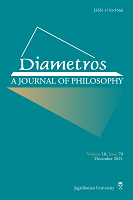How Does Historical Faith Complement Immanuel Kant’s Philosophy of Religion?
How Does Historical Faith Complement Immanuel Kant’s Philosophy of Religion?
Author(s): Tomasz KupśSubject(s): Ethics / Practical Philosophy, Philosophy of Religion
Published by: Instytut Filozofii Uniwersytetu Jagiellońskiego
Keywords: Immanuel Kant; historical faith; pure rational religion; “deep structure”; “moral gap”; philosophy of religion; ethics;
Summary/Abstract: A shift away from exclusionary moral reductionism can be discerned in modern interpretations of Kant’s philosophy of religion. Consequently, at least since the 1970s, historical faith has been appreciated as a necessary and desirable element of Kant’s philosophy of religion. One of the reasons prompting Kant to include historical faith in his system of the philosophy of religion is what commentators on Kant’s philosophy call the ‘moral gap’ as there is a disproportion between the limited competence of man as a natural being and moral goals that seem unattainable. For the believer, the content of historical faith offers a real solution to the disproportion between his limitations as a natural being and the goals set for him by practical reason. For the believer, the ‘moral gap’ is not just a theoretical problem, but an existential challenge whose solution lies beyond his own limited competence. In this article, I consider whether historical faith can also provide a theoretical supplement to the picture of one’s own life. If so, then the content of historical faith may also prove important for the non-believer.
Journal: Diametros
- Issue Year: 18/2021
- Issue No: 69
- Page Range: 1-19
- Page Count: 19
- Language: English

